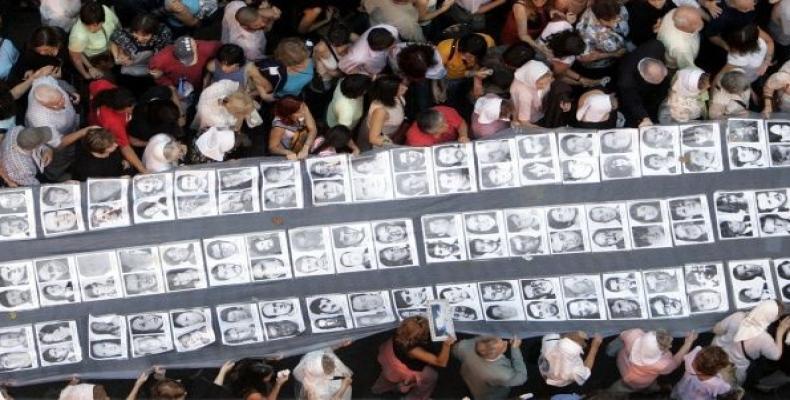Buenos Aires, July 28 (RHC)-- In Argentina, 28 former officials of the country's military dictatorship, including four former judges, have received the maximum sentence of life imprisonment.
The people of Argentina have finally received “Mega Justice” following over 200 hearings, 300 witnesses testimonies, and a painful investigation of documents, files, and other evidence relating to crimes against humanity committed by 28 former officials in Argentina's military dictatorship that ruled the country from 1975 to 1983.
Twenty-eight armed service members, prison guards, police officers and civilians as well as four former judges stood accused of perpetrating or colluding in rape, torture, murder, kidnapping and enforced disappearances affecting approximately 200 victims.
The former judges — Otilio Romano, Guillermo Petra Recabarren, Luis Francisco Miret and Rolando Carrizo — were among the most powerful officials during the period of military dictatorship, and continued to serve as top magistrates following Argentina's transition to democracy.
In a first for Argentina, the four former judges faced judgment by their peers in the same building where they committed their crimes against the people of the country.
Each of them received the maximum sentence of life in prison for charges of homicide aggravated by treachery, unlawful deprivation of freedom aggravated by violence and threats, torture aggravated by the political persecution, aggravated robbery and illicit association, among other charges.
Eight of their co-defendants also received the maximum penalty. Four defendants were freed, with three facing acquittal and another defendant receiving a minor sentence. The remainder of the defendants received sentences ranging from five to 20 years.
"Society is with us," said Norma Ríos from Argentina's Permanent Assembly for Human Rights, who traveled from Buenos Aires to be present for the sentencing.
From early morning on, over a 1,000 human rights activists gathered around the federal criminal court in the city of Mendoza in anticipation of the sentencing, which is a landmark moment for the human rights cause.
"This is the most important trial in the history of the province of Mendoza," said prosecutor Pablo Salinas of the Ecumenical Movement for Human Rights.
28 Ex-Officials of Argentina's Military Dictatorship Sentenced

Artículos Relacionados
Comentarios
Deja un comentario
Todos los campos son requeridosMás Vistas
- Capitán San Luis: el mejor hombre de la guerrilla
- Canciller de Cuba reiteró rechazo a ataques de Israel contra Gaza
- China reafirma apuesta por turismo en Cuba y desarrollo del multidestino (+Fotos)
- Atletismo cubano se cita en el Estadio Panamericano de la capital cubana en su V Confrontación
- Cubano Raidel Martínez imbatible en Liga Japonesa de Béisbol Profesional

